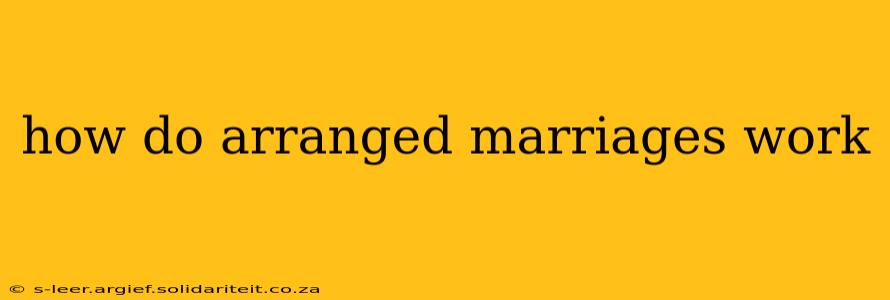Arranged marriages, a practice prevalent in many cultures across the globe, often differ significantly from the Western concept of choosing one's own spouse. While the specifics vary widely depending on region, religion, and family dynamics, some common threads weave through the process. This guide will delve into the intricacies of arranged marriages, answering common questions and dispelling misconceptions.
What is an Arranged Marriage?
An arranged marriage is a marriage where the choice of spouse is influenced or determined by the families of the individuals involved, rather than solely by the individuals themselves. This doesn't necessarily mean the couple has no say in the matter; the level of involvement varies greatly. In some cultures, the couple may meet and date before the wedding, while in others, the first meeting might occur on the wedding day. The core principle, however, remains the family's significant role in selecting a suitable partner.
How Do Families Find Suitable Partners?
The methods used to find potential partners are as diverse as the cultures themselves. Some common approaches include:
- Family Networks: Relatives and close friends often play a crucial role, suggesting potential matches based on shared values, social standing, and compatibility. This leveraging of existing social connections is a cornerstone of the process.
- Matchmakers (or intermediaries): Professional or community-based matchmakers exist in many cultures. They act as go-betweens, facilitating introductions and vetting potential candidates. Their expertise lies in understanding family preferences and cultural nuances.
- Matrimonial Websites and Apps: With the advent of technology, online platforms dedicated to arranged marriages have become increasingly popular. These platforms often incorporate sophisticated filtering mechanisms to refine searches based on various criteria.
What Factors Are Considered When Choosing a Partner?
The criteria considered when selecting a spouse are multifaceted and often reflect traditional values and societal expectations. Some commonly considered factors include:
- Caste and Religion: In some communities, adherence to specific caste or religious boundaries is paramount.
- Family Background and Social Standing: The family's reputation, education, and economic stability are often heavily weighed.
- Education and Profession: The potential spouse's educational attainment and career prospects are considered indicators of future stability and success.
- Personality and Compatibility: While the emphasis varies, families often seek individuals with compatible personalities and values. This might involve discussions with family members or even brief meetings before a final decision.
Do Couples Have Any Say in Arranged Marriages?
The extent to which couples have a say in the process varies tremendously. While in some cases, the decision is entirely dictated by family elders, many modern arranged marriages involve a greater degree of individual agency. Couples may meet and interact before marriage, often engaging in courtship or dating, to gauge compatibility and make an informed decision. Ultimately, the level of individual involvement is often a negotiation between family and prospective partners.
What Happens After the Match is Made?
Once a potential match is identified, the process often involves:
- Initial Meetings: The couple may have supervised meetings to get to know each other.
- Family Approval: Both families need to agree to the match before proceeding further.
- Engagement and Wedding Planning: Once approved, engagement ceremonies and wedding preparations begin.
Are Arranged Marriages Successful?
The success rate of arranged marriages is a complex issue with differing perspectives. While some studies suggest comparable divorce rates to love marriages in certain contexts, the definition of success itself can be culturally nuanced. Factors like communication, shared values, and the ability to adapt and compromise significantly influence the longevity and happiness of any marriage, regardless of how the union is formed.
Is There Pressure in Arranged Marriages?
The pressure experienced in arranged marriages varies greatly. Some individuals feel immense pressure to conform to family expectations, while others experience a supportive and collaborative family dynamic throughout the process. Open communication and a willingness to address concerns are crucial for navigating potential challenges.
What are the Common Misconceptions About Arranged Marriages?
A significant misconception is that arranged marriages are forced unions where individuals have no say. While forced marriages do unfortunately exist, the vast majority of arranged marriages involve a degree of choice and consideration of the individuals involved. Another misconception is that arranged marriages are inherently unhappy or unsuccessful. The reality is as diverse as the cultures that practice them.
This overview aims to provide a nuanced understanding of the complex and multifaceted world of arranged marriages. Remember, this is a broad generalization, and the specific practices vary significantly based on cultural, religious, and regional factors.
